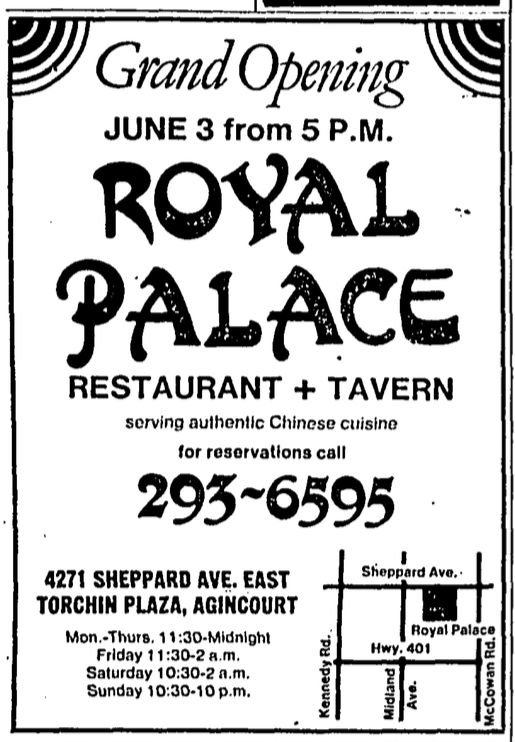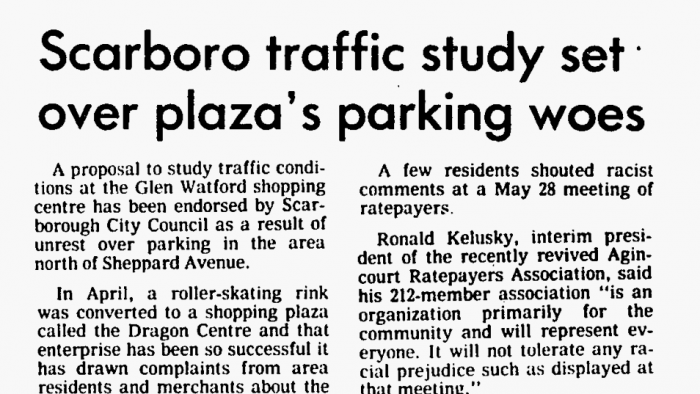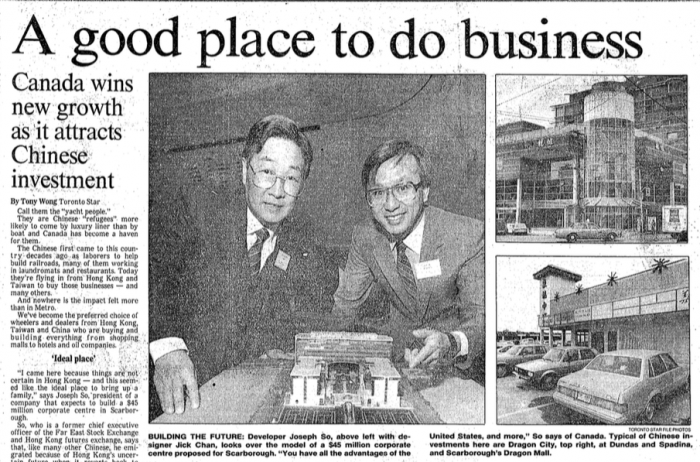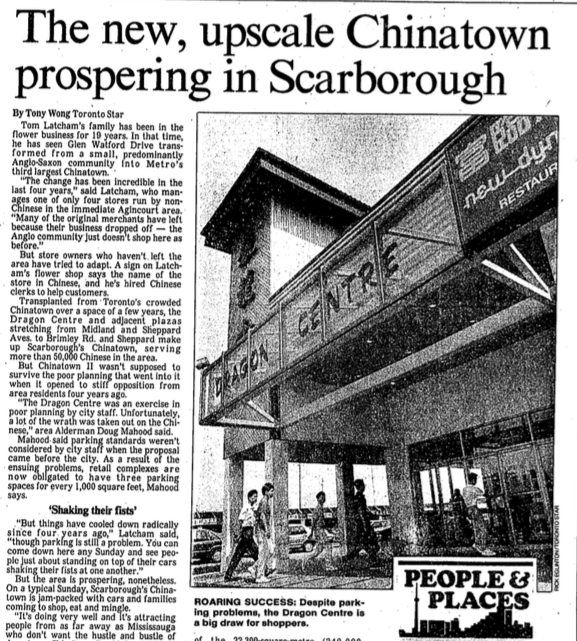Scarborough Timeline
士嘉堡的發展時序

1967 | 1967年
Immigration Regulations replaced country of origin preferences with a points-based admissions process focusing on education, occupational skills, employment, age, proficiency in English and French, and personal character.
移民條例採用積分系統錄取的程序取代了對原籍國的偏好,系統積分的重點是教育,職業技能,就業,年齡,英語和法語的熟練程度以及個人特徵。
1971 | 1971年
The Canadian Multiculturalism Policy was the first federal recognition of Canadian diversity. Along with the subsequent Canadian Multiculturalism Act (1988), it was created to support cultural groups, reduce discriminatory barriers, and assist with intercultural exchange and French/English language learning.
加拿大多元文化政策是加拿大聯邦多樣性的第一個的認可。 與隨後的加拿大多元文化法案(1988年)一起,它旨在支持文化群體,減少歧視性障礙,並協助跨文化交流和法語/英語語言學習。
1977 | 1977年
Torchin Plaza opens
國泰商場開業

廣告是皇宮酒店的開幕時的報導, 六月,環球郵報
1979 | 1979年
The first Chinese restaurant and grocery opened in Scarborough at Glen Watford and Sheppard
第一家中餐館和超市在士嘉堡的Glen Watford和Sheppard開業
1982 | 1982年
Glen Watford Plaza opens
怡東商場開業
1982 | 1982年
North York-Scarborough Chinese Business Association formed
北約克-士嘉堡中國商業協會成立
1983 | 1983年
Guy Harris creates the Task Force on Multiculturalism and Race Relations
蓋·哈里斯(Guy Harris)創建了專責小組促進多元文化和種族關係
1983 | 1983年
Cullen Country Barns opens at Steeles and Kennedy Road in Markham. Len Cullen creates a tourist attraction by housing boutiques and restaurants in several relocated Ontario barns.
Cullen Country Barns(現在的太古廣場)在萬錦市Steeles和Kennedy交接處開業。Len Cullen在安省幾處重新選址的穀倉中開設精品店和餐廳,從而創造了一個旅遊勝地。
1984 | 1984年
Daniel and Henry Hung of the Hong Kong-based Shiu Pong development company opened Dragon Centre.
熊氏兄弟丹尼爾和亨利在香港的紹邦開發公司在慶龍中心開業
1984 | 1984年
500 people met with local alderman Bob Aaroe to protest parking “chaos” at the new mall.
500人會見了當地的市議員Bob Aaroe抗議新建商場所導致“混亂”停車場

1984年6月12日,《環球郵報》(Globe&Mail)慶龍中心停車爭議的報導
1984 | 1984年
Federation of Chinese-Canadians in Scarborough established
士嘉堡華裔加拿大人聯合會成立

1984年6月4日《環球郵報》報導反華反彈
1984 | 1984年
Anti-Chinese pamphlets authored by Margaret Hunter (a fake name) are distributed in the neighbourhood.
Margaret Hunter(假名)創作的反華小冊子散佈在周圍鄰居

1984年7月9日《多倫多星報》報導反華反彈
1985 | 1985年
Scarborough Report on Race Relations recommended revising the city’s policies and programs to reduce discrimination and promote multiculturalism.
The Planning Committee complete the Glen Watford commercial area study.
士嘉堡種族關係報告建議修訂該市的政策和計劃,以減少歧視和促進多元文化為主義。
計劃委員會完成了Glen Watford商業區研究
1986 | 1986年
Federal Canadian Immigrant Investor Program established (CANIIP). In order to grow the economy, Canada began to entice foreign investors by granting landed immigrant status to those who loaned $800,000 to a provincial government, interest-free, for five years.
加拿大聯邦移民投資者計劃建立(CANIIP)。 為了發展經濟,加拿大開始吸引外國投資者,五年內無息貸款給省政府80萬元的投資者可以獲得本地移民身份。

1988年 多倫多星報上報導中國香港對大多倫多地區商業上的投資其中包括慶龍中心和龍城(市中心)
1986 | 1986年
Plans for a Chinese theatre at Chartwell Plaza (Brimley Road and Chartland Boulevard) are scrapped by developer fearing racial tensions following local complaints about increased traffic.
開發商擔心當地人抱怨客流量增加導致種族緊張,因此取消了在集友市場創建中國劇院的計劃。

1986年3月1日,《環球郵報》集友市場開發項目報導。
1986 | 1986年
Conference on race relations held in Scarborough to address concerns about parking, noise, zoning, and planning practices.
在士嘉堡舉行的種族關係會議,旨在解決有關停車,噪音,分區和規劃做法的問題。

1986年6月30日,《環球郵報》種族關係會議報導
1988 | 1988年
The Mississauga Chinese Centre, a 100,000 square foot shopping and cultural centre, opens.
佔地100,000平方英尺的購物文化中心 在密西沙加中國中心開業。
1989 | 1989年
Chinatown Centre, the GTA’s first Chinese condominium mall, opened on Spadina in Toronto’s Chinatown West. Developed by Hong Kong-based Manbro Holdings Ontario, it replaced China Court, an Oriental-themed outdoor shopping plaza that had opened in 1980.
大多倫多地區第一家中國公寓式購物中心在多倫多唐人街西的士巴丹拿開業。 由香港的Manbro Holdings開發,它取代了1980年開業的東方主題戶外購物廣場China Court。

1988年《多倫多星報》報導了新的“高檔”中國商務區
1990 | 1990年
Market Village, a themed English village outdoor shopping centre, opens next door to Cullen Country Barns. Chinese businesses begin to open in the mall, including two supermarkets and the GTA’s only cinema dedicated to Hong Kong films.
市場村緊挨著Cullen Country Barns,是一個主題為英國鄉村的戶外購物中心。 中國商家開始在這個購物中心開業,其中包括兩家超市和大多倫多地區唯一家專門播放香港電影的電影院。
1993 | 1993年
Pacific Mall and Bayview Landmark development projects are debated by planners, residents, and businesses. Joseph Wong, president of the Chinese Canadian National Council, argued that restrictions on condo malls were discriminatory.
規劃師,居民和企業對太古和灣景區項目的開發項目進行辯論。 加拿大華裔全國理事會主席王若瑟(Joseph Wong)認為,限制公寓商場是具有歧視性的。
1994 | 1994年
City of Richmond Hill temporarily freezes applications for shopping mall developments in order to study parking and pedestrian needs.
Cullen Country Barns closes, and the Torgan Group proposes an Asian-themed shopping centre, Pacific Mall, in Markham.
列治文山市以研究停車位和行人需求暫時凍結了購物中心開發的申請。
Cullen Country Barns關閉,Torgan集團提議在萬錦市建立一個亞洲主題的購物中心 - 太古廣場。
1995 | 1995年
Markham deputy mayor Carole Bell complained at a regional council retreat that “we once had one of the finest communities in North America with enviable business parks and the top corporations of the land. Now all we get are [Chinese] theme malls to serve people way beyond our borders.”
Market Village is redeveloped to include “enclosed streets”
萬錦市副市長Carole Bell一次在區域委員會會議上抱怨說:“我們曾經是北美最好的社區之一,擁有令人羨慕的商業園區和最好的商業公司。 現在我們得到的只是以[中國]為主題購物中心,從而去為別的區域的人們服務。”
市場村對曾經“封閉的街道”進行重新開發。
1997 | 1997年
After 156 years of British colonial rule, control of Hong Kong is transferred to China. Nearly 1 million people migrated from Hong Kong during the 1980s and 90s.
Pacific Mall is completed following a lengthy redesign process including changes to the exterior to evoke the barn shed architecture of rural Ontario.
經過156年的英國殖民統治,香港的控制權移交給了中國。 在1980年代和90年代,有近100萬人從香港移民。
太古經過漫長的重新設計過程終於竣工,其實包括對外部的改變以及喚起安大略省鄉村的穀倉棚建築。
2014 | 2014年
CANIIP terminated in response to criticism that it was vulnerable to fraud and served as a pathway to citizenship for only the very wealthy. Over 130,000 people participated in the program, the majority of them from China. Provincial immigrant investor programmes continue to operate.
加拿大聯邦移民投資者計劃終止,因為人們利用欺詐手段移民,並且這個幾乎僅是為非常富有的人提供公民身份的途徑。 超過13萬人參加了該計劃,其中大部分來自中國。但是各個省級移民投資者計劃會繼續運作。
2018 | 2018年
Market Village businesses close and the buildings are demolished to make way for a new development, Remington Centre, which will include a mall and high-rise residences.
城市廣場拆除了原有大樓的建築,關閉所有的商家。就是為了給新開發的滙通廣場騰出空間,將該中心建立成包括購物中心的高層住宅。